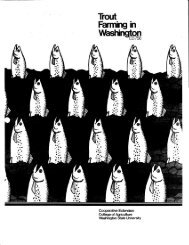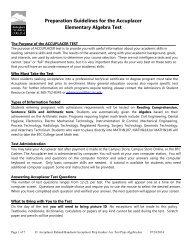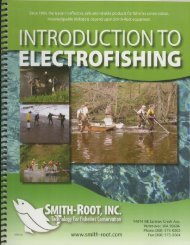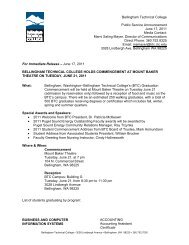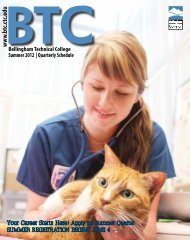- Page 2 and 3:
FishHatcheryManagement
- Page 4 and 5:
FishHatcheryManagementRobert G. Pip
- Page 6 and 7:
ContentsPreface xaAbbreviations Use
- Page 8 and 9:
CONTENTSViiBluegill 76Channel Catfi
- Page 10 and 11:
coNTEN't SlxMontana Hatching Box |
- Page 12 and 13:
CONI'ENI'SElimination of Fish 284Pr
- Page 14:
CONTL,NTSXIIIAppendix B: Ammonia Io
- Page 17 and 18:
FISH HA,I.CH ER.I' MANAL; EM FNTThe
- Page 20 and 21:
Abbreviations Usedin the TextBHA bu
- Page 22 and 23:
Common and ScientificNames of Fishe
- Page 24:
FishHatch"ryManagement
- Page 27 and 28:
FISH HA'fCHERY MANAGE,MENTare geare
- Page 29 and 30:
FISH HAfCHERYMANAGEMENTdecreases-th
- Page 31 and 32:
t,.ISH HA'I'CI{ERY M ANAGL,M DN-I'0
- Page 33 and 34:
IOFISII HAI.CHERY MANAGEMENl.resist
- Page 35 and 36:
12 r'rsH HAICHERY MANAGEMENTalone (
- Page 37 and 38:
l4FISH HA'lcHERY MANACEMENI'TABLT.
- Page 39 and 40:
l6FTSH HATCnltRy NIANAcENlltNtWater
- Page 41 and 42:
l8 FISH HATCHERY MANAGEMENTFIGURE 6
- Page 43 and 44:
20 FISH IJAl'CIIERY MANAGIJM I]NI'F
- Page 45 and 46:
,2,2FISHIIAI.CIIERYMANAC;EMEN'l(whi
- Page 47 and 48:
FISH HATCHL,RY MANAGEMEN'IWASTE SLU
- Page 49 and 50:
I ISH HA'ICHIR}'N'lANAC;L,M NNTlies
- Page 51 and 52:
FISH HA'I'CHERY MANAGEMEN'I'R FORAT
- Page 53 and 54:
30 FISH HATCHERY MANAGEMENTFIGURE 1
- Page 55 and 56:
32 FISH HATCHERY MANAGEMENTFIGURE 1
- Page 57 and 58:
lJ.1IIISII IIA'I'CI I I]R\' NIANAOF
- Page 59 and 60:
3bIISH HA'TCHF],RY MANAG!]MEi\'ITAB
- Page 61 and 62:
3llFlsH llA r( Ht.R\ MANAULMLN ITAB
- Page 63 and 64:
40 FISHHAIcHIIRYNtANAcL,.N{Er\-Ttem
- Page 65 and 66:
42 FISH HATCHERY MANAGEMENTFTGURE 1
- Page 67 and 68:
44 FISH HATCHERY MANAGEMENTFIGURE 1
- Page 69 and 70:
FISH HATCHERYMANAGEMENTlllr,la::i;
- Page 71 and 72:
FISH HATCHERY MANAGEMENTDRAIN PIPES
- Page 73 and 74:
FISH HATCHERY MANAGEMEN'IPEN REARIN
- Page 75 and 76:
52 FrsH HATcIIERy MANAcEMENT'Tast.e
- Page 77 and 78:
FISH HATCHERY MANAGEMENTTeSLt 7. Ty
- Page 79 and 80:
56 FISH HA'I'CHERY MANAGEMENTBovn,
- Page 81 and 82:
58 FIsH HATCHERY MANAGEMENTand Rox.
- Page 83 and 84:
2Hatch"ryOperationsProduction Metho
- Page 85 and 86:
62 FISH HATCHERY MANAGEMENTdaily, w
- Page 87 and 88:
64 FISH HA.I.CHERY MANAGEMENToxygen
- Page 89 and 90:
FISH HATCHERY MANAGEMENTIaf,Loa ozl
- Page 91 and 92:
FISH HATCHERY MANAGEMENTadding fish
- Page 93 and 94:
FISH HATCHERY MANAGEMENTtemperature
- Page 95 and 96:
FISH HATCHERY MANAGEMENT3.53.0>- 2.
- Page 97 and 98:
74 FISH HATCHERY MANAGEMENTTABLE IO
- Page 99 and 100:
FISH HATCHERY MANAGEMEN'Timproved e
- Page 101 and 102:
78 FISH HATCHERY MANAGEMENTculture
- Page 103 and 104:
80 FISH HATCHERY MANAGEMENTFIGURE 2
- Page 105 and 106:
82 FISH HATCHERY MANAGEMENTFIGURE 3
- Page 107 and 108: FISH HAI'CHEI{Y MANAGEMENl'several
- Page 109 and 110: 86 FISH HATCHERY MANAGDMENTFIGURE 3
- Page 111 and 112: FISH HATCHERY MANAGEMENTFtcuRE 35.
- Page 113 and 114: FISH HA'I'CHERY MANAGEMENTponds' es
- Page 115 and 116: 92 FISH HATCHERY MANAGEMENTFrcunn 3
- Page 117 and 118: 94 FISH HATCHERY MANAGEMENTFERTILIZ
- Page 119 and 120: FISH HA'f CHLI{Y MANAGL,MEN'Iand wa
- Page 121 and 122: I ISH HA'I'CHLRY NTANAGEME,NTINORGA
- Page 123 and 124: 100 FISH HATcHERY MANAcIEMEN fA num
- Page 125 and 126: IO2FISH HATCHERY MANAGEMENTexperien
- Page 127 and 128: IO4FISH HATCHERY MANAGEMENTthat the
- Page 129 and 130: 106 FrsH HAT CHF,Ry NIA\AcE1\'rE\'l
- Page 131 and 132: 108 FISH HATCHERY MANAGEMDNTFIGURE
- Page 133 and 134: ll0FISH HATCHERY MANAGEMENT(3) If t
- Page 135 and 136: 112 FISH HATCHERY MANAGIJMEN'frecom
- Page 137 and 138: t4 FISH HATCHERY MANAGEMENTfish. Mo
- Page 139 and 140: 1 16 FrsH HA t cHERy MANAGL,MENTPro
- Page 141 and 142: ll8FISH HA'TCHERY MANAGEMENTand fee
- Page 143 and 144: 120 FISH HATCHERY MANAGEMENTTABLE I
- Page 145 and 146: 22FISH HATCHERY MANAGEMENTColumn 27
- Page 147 and 148: 124 FISH HAlcHERy MANAGEMENTColumn
- Page 149 and 150: 126 FISH HATCHERY MANAGEMENTColumn
- Page 151 and 152: 128 FISH HA.l.cHERy MANAGEMENTIssr.
- Page 153 and 154: I30FISH HATcHERY MANAGEMENTTRL Ssll
- Page 155 and 156: t32FISH HATCHERY MANAGEMENTA cq uis
- Page 157: 13.1 FISH HA'fC]HLRY NIANAGEMENl.TA
- Page 161 and 162: 138 FISH HATCHERY MANAGEMENTChannel
- Page 163 and 164: 140 FISH HATCHERY MANAGEMENTForage
- Page 165 and 166: 142 FISH HATCHERY MANAGEMENTfeet ou
- Page 167 and 168: 44FISH HAI'CHERY MANAGEMENl'When go
- Page 169 and 170: 146 FISH HAI'CHERY MANAGEMENTLIN EB
- Page 171 and 172: 148 FISH HATCHERY MANAGEMEN'I(1) Av
- Page 173 and 174: I rl0 I:lSH llA lCHl.lRY NIANi\(;U\
- Page 175 and 176: 52F'ISH HATCHERY MANAGF:,MENTpond.
- Page 177 and 178: t54 FISH HATCHERY MANAGEMENTFIGURE
- Page 179 and 180: 156 FISH HA'I'CHERY MANAGEMENlThe p
- Page 181 and 182: I58 FISH HATCHERY MANAGEMENTFIcunn
- Page 183 and 184: 160 I'ISH HATCHERY MANAGEMENIThe eg
- Page 185 and 186: t62 FISH HATCHERY MANAGEMENTl0 hrs.
- Page 187 and 188: 164 FISH HATCHERY MANAGEMENTOvenipe
- Page 189 and 190: t66 FISH HATCHERY MANAGEMENTsystems
- Page 191 and 192: 168 FISH HA'I'CHERY MANAGEMENTThe a
- Page 193 and 194: t70FISH HATCHERY MANAGEMENTequilibr
- Page 195 and 196: 172 FISH HATCHERY MANAGEMENTripens
- Page 197 and 198: 174 FISH HATCHERY MANAGEMENTthe fis
- Page 199 and 200: 176 FISH HATCHERY MANAGEMENTERMINAL
- Page 201 and 202: 178 FISH HATCHERY MANAGEMENTSO M IT
- Page 203 and 204: 180 FISH HATCHERY MANAGEMENTHI RD V
- Page 205 and 206: I82FISH HATCHERY MANAGEMENTA sample
- Page 207 and 208: 184 FISH HAI'CHERY MANAGEMENTTABLE
- Page 209 and 210:
186 FISH HATCHERY MANAGEMENTFrcunr
- Page 211 and 212:
188 FISH HATCHERY MANAGEMENTl/4" co
- Page 213 and 214:
190 FISH HATCHERY MANAGEMENTTAtsLE
- Page 215 and 216:
t92FISH HA'I'CHERY MANAGEMENTTeslr
- Page 217 and 218:
t94 FISH HATCHERY MANAGEMDNTillFIGU
- Page 219 and 220:
196 FISH HATCHERY MANAGEMENTFtcunn
- Page 221 and 222:
198 FISH HATCHERY MANAGEMENTFIGURE
- Page 223 and 224:
200 F'rsH HA'rcHERy MANAcEMENTsimil
- Page 225 and 226:
202 FrsH HAlcHERy MANAGEMENTCl,lnx,
- Page 227 and 228:
204 FISH HATCHERY MANAGEMENT-. 1977
- Page 229 and 230:
206 FISH HATCHERy MANAGEMENT'SAI-tL
- Page 231 and 232:
Nutrition and FeedingNutritionNutri
- Page 233 and 234:
2t0FISH HA'I'CIIERY MANAGEME,NTpell
- Page 235 and 236:
IISH }IA]'CHERY MANA(;EMEN'TAt this
- Page 237 and 238:
214 FISH HATCHERY MANAGT]MENTof pro
- Page 239 and 240:
2t6FISH HATCHERY MANAGEMENTfeed tha
- Page 241 and 242:
2lu! ISH HAl CHERY MANA(IEMliN lthe
- Page 243 and 244:
FISH HA'I'CHERY MANAGE,MENTNo carbo
- Page 245 and 246:
FISH HATCHf,RY MANAGEMEN']Body fat
- Page 247 and 248:
224 FISH HA t CHITRY MANAGEMIlNTLIP
- Page 249 and 250:
FISH HATCHERY MANAGEMENTNutrientGro
- Page 251 and 252:
228 F'ISH HATCHERY MANAGL,MEN'Ivita
- Page 253 and 254:
F'ISH HATCHERY MANAGEMEN'fr,. r; "'
- Page 255 and 256:
232 FISH HATCHERY MANAGEMEN'Ibreakd
- Page 257 and 258:
234 FISH HATCHERY MANAGEMFNTFORMULA
- Page 259 and 260:
236 FISH HAI'CHERY MANAGEMENT(2) Be
- Page 261 and 262:
238 FISH HATCHERY MANAGEMENTphysica
- Page 263 and 264:
240 FlsH HAT('HFRY MANAGLMI.N ITesl
- Page 265 and 266:
242 FISH HATCHERY MANAGEMENTTenr-E
- Page 267 and 268:
244 FISH HATCHERY MANAGEMENTTest E
- Page 269 and 270:
246 FISH HATCHERY MANAGEMENTA simpl
- Page 271 and 272:
248 FISH HATCHERY MANAGEMENTThe amo
- Page 273 and 274:
250 FISH HATCHERY MANAGEMENTFIcunt
- Page 275 and 276:
252 FISH HATCHERY MANAGEMENTasI-E 2
- Page 277 and 278:
254 FtsH HAtcHERY MANAGEMENTTABLE 3
- Page 279 and 280:
256 FISH HATcHERY MANAGEMENTTABLE 3
- Page 281 and 282:
258 FISH HATCHERY MANAGEMEN'I'TABLE
- Page 283 and 284:
260 FISH HATCHERY MANAGEMENTBibliog
- Page 285 and 286:
262 FISH HATCHERY MANAGEMENTnology
- Page 287 and 288:
264 FISH HATCHERY MANAGEMENTa diagn
- Page 289 and 290:
266 FISH HATCHERY MANAGEMEN'I'ABFtc
- Page 291 and 292:
FISH HATCHERY MANAGEMENT.fABLEIHI]I
- Page 293 and 294:
270 FISH HATCHERY MANAGEMENTin the
- Page 295 and 296:
FISH HATCHERY MANAGEMENTpossible ad
- Page 297 and 298:
274 FISH HATcHERY MANAGEMENTGeneral
- Page 299 and 300:
276 FISH HATCHERY MANAGE,MENltoxici
- Page 301 and 302:
278 FISH HATCHERY MANAGEMENTRecomme
- Page 303 and 304:
280 FISH HATCHERY MANAGEMENTIf it i
- Page 305 and 306:
282 FISH HATCHERY MANAGEMENTexterna
- Page 307 and 308:
FISH HATCHERY MANAGEMEN'fF aci lity
- Page 309 and 310:
FISH HATCHERY MANAGEMENlcleanliness
- Page 311 and 312:
FISH HA'I'CHERY MANAGEMEN'IImmunila
- Page 313 and 314:
290 FISH HATCHERY MANAGEMENTherds o
- Page 315 and 316:
FISH HAI'CHERY MANAGEMENTdiseases.
- Page 317 and 318:
FISH HATCHERY MANAGEMENTDiseases of
- Page 319 and 320:
296 FISH HATCHERY MANAGEMENTpetechi
- Page 321 and 322:
298 FISH HATCHERY MANAGEMENTCHANNEL
- Page 323 and 324:
FISH HATCHERYMANAGEMENTFtcunn 79. L
- Page 325 and 326:
FISH HATCHERY MANAC;EMEN'I'COI,UMNA
- Page 327 and 328:
FISH HATCHERY MANAGEMENTthe pectora
- Page 329 and 330:
306 FISH HATCHERY MANAGEMENTreservo
- Page 331 and 332:
FISH HATCHERYMANAGEMENTFIcunn 81. E
- Page 333 and 334:
310 FISH HATCHERY MANAGEMENTFtcunn
- Page 335 and 336:
31,2 F'ISH HATCHERY MANAGEMEN'IKIDN
- Page 337 and 338:
314 FISH HATCHERY MANAGEMEN'TFungus
- Page 339 and 340:
316 FISH HATCHERY MANAGEMENTFrcuRr
- Page 341 and 342:
318 FISH HATCHERY MANAGEMENTFIGURE
- Page 343 and 344:
320 FISH HATCHERY MANAGDMENTFIGURE
- Page 345 and 346:
322 FISH HATCHERY MANAGEMENTFIcunn
- Page 347 and 348:
FISH HATCHERY MANAGEMEN IFtcunE 95.
- Page 349 and 350:
FISH HA'TCHERY MANAGEMENTFIGURE 97.
- Page 351 and 352:
328 FISH HATCHERY MANAGEMENTFIcune
- Page 353 and 354:
330 FISH HATCHERY MANAGEMENTand l6
- Page 355 and 356:
332 FISH HATCHERY MANAGEMENTFrcuRE
- Page 357 and 358:
334 FISH HATCHERY MANAGEMENTARGULUS
- Page 359 and 360:
336 FtsH HAiCHERY MANACEMEN]DIAGNOS
- Page 361 and 362:
338 FISH HATCHERY MANAGEMENTI 2. B(
- Page 363 and 364:
lJ40}ISH HA'I CHERY MANAGENlI]N]23.
- Page 365 and 366:
342 FISH HATCHERY MANAGEM EN.Tshoul
- Page 367 and 368:
344 FISH HATCHL,RY MANAGEMENTFDL-46
- Page 369 and 370:
346 FISH HATCHERY MANAGEMENTHterlrw
- Page 371 and 372:
Transportation of LiveFishesOne ext
- Page 373 and 374:
350 FISH HATCHERY MANAGEMENTTrucks
- Page 375 and 376:
352 FISH HATCHERY NlANAC; EMEN.'f(1
- Page 377 and 378:
FISH HATCHERYMANAGEMENTFIcunn 110.
- Page 379 and 380:
356 FISH HATCHERY MANAGEMENTTempera
- Page 381 and 382:
358 FISH HATCHERY MANAGEMENTdistres
- Page 383 and 384:
360 FISH HA'TCHERY MANAGEMENTTABLE
- Page 385 and 386:
362 FISH HATCHERY MANAGEMENTCHANNEL
- Page 387 and 388:
FISH HATCHERY MANAGEMENTTASLE ,13.
- Page 389 and 390:
FISH HATCHERY MANAGEMEN'fTeslr 44.
- Page 391 and 392:
368 FISH HATCHERY MANAGEMENTBibliog
- Page 393 and 394:
370 FISH HATCHERY MANAGEMENTLEI'IRI
- Page 396 and 397:
Appendices
- Page 398 and 399:
376 FtsH HATcHF,Ry N,rANAcFtMriNTTa
- Page 400 and 401:
AppendixAmmonia IonizationTABLE B I
- Page 402 and 403:
380 FISH HATCHERY MANAGEMENTTanlr B
- Page 404 and 405:
382 FISH HATCHERY MANAGEMENTTenln B
- Page 406 and 407:
Appendi* DUse of Weirs to MeasureFl
- Page 408 and 409:
FISH HATCHERY MANAGEMENTTABLED_I.RE
- Page 410 and 411:
388 r'lsH HA'rcHERy MANAGEMENTTasLn
- Page 412 and 413:
trAppendix fNutritional Diseases an
- Page 414 and 415:
392 FISH HATCHERY MANAGEMENTTABLE F
- Page 416 and 417:
394 FISH HATCHERY MANAGEMENTTABLE F
- Page 418 and 419:
396 FISH HATCHERY MANAGEMENTT,\sLr:
- Page 420 and 421:
398 FISH HATCHERY MANAGEMENTTeslr F
- Page 422 and 423:
400 FISH HATCHERY MANAGEMENTTasLE F
- Page 424 and 425:
402 FISH HATCHERY MANAGEMENTCalcula
- Page 426 and 427:
404 FISH HATCHERY MANAGEMENTFIGURE
- Page 428 and 429:
TAppendix ILength-Weight TablesGuid
- Page 430 and 431:
408 FISH HATCHERY MANAGEMENl'Tasr-E
- Page 432 and 433:
410 FISH HATCHERY MANACEMENTTABLE I
- Page 434 and 435:
412 FISH HATCHERY MANAGEMENTTaglr I
- Page 436 and 437:
4t4FISH HATCHERY MANAGEMENTTenlr, I
- Page 438 and 439:
416 FISH HATCHERY MANAGEMENTTABLE I
- Page 440 and 441:
418 FISH HATCHERY MANAGEMENTTABLE I
- Page 442 and 443:
420 FISH HATCHERY MANAGEMENTTABLE I
- Page 444 and 445:
422 FISH HATCHERY MANAGEMENTTABLE I
- Page 446 and 447:
424 FISH HATCHERY MANAGEMENTTenle I
- Page 448 and 449:
426 FISH HATCHERY MANAGEMENTTesLB I
- Page 450 and 451:
428 FISH HATCHERY MANAGEMENTTanr,B
- Page 452 and 453:
430 FISH HATCHERY MANAGEMENTTABLE I
- Page 454 and 455:
432 FISH HATCHERY MANAGEMENTTanlr I
- Page 456 and 457:
434 FISH HATCHERY MANAGEMENTTesr.E
- Page 458 and 459:
436 FISH HATCHERY MANAGEMENTTesr-E
- Page 460 and 461:
438 FISH HATCHERY MANAGEMENTTllg f
- Page 462 and 463:
440 FISH HATCHERY MANAGEMENTTABLE I
- Page 464 and 465:
442FISH HATCHERY MANAGEMENTTABLEI-5
- Page 466 and 467:
444 FISH HATCHERY MANAGEMENTTasle I
- Page 468 and 469:
446 FISH HATCHLRY MANAGEMENTTABLE I
- Page 470 and 471:
448 FISH HATCHERY MANAGEMENTTenr,E
- Page 472 and 473:
450 FISH HATCHERY MANAGEMENTTaer-E
- Page 474 and 475:
452 FISH HATCHERY MANAGEMENTTeu-E I
- Page 476 and 477:
454 FISH HATCHERY MANAGEMENTTABLE I
- Page 478 and 479:
FISH HATCHERY MANAGEMENTT,qarn I-7.
- Page 480 and 481:
458 FISH HATCHERY MANAGEMENTTasr,E
- Page 482 and 483:
FISH HATCHERY MANAGEMENl'Tasln I-7.
- Page 484 and 485:
FISH HATCHERY MANAGEMENTTABLE I-8.c
- Page 486 and 487:
464 FISH HATCHERY MANAGEMENTTnnu, I
- Page 488 and 489:
466 FISH HATCHERY MANAGEMENTTest,n
- Page 491 and 492:
GlossaryAbdomenBelly; the ventral s
- Page 493 and 494:
GLOSSARY47IAmmonium The ionized for
- Page 495 and 496:
GLOSSARY 473BacteriocidalBacteriost
- Page 497 and 498:
GLOSSARY 47 5CarnivorousCarrierthe
- Page 499 and 500:
GLOSSARY 477Control (Experimental)
- Page 501 and 502:
GLOSSARY 479EctodermThe outer layer
- Page 503 and 504:
GLOSSARY48IFixativeA chemical agent
- Page 505 and 506:
GLOSSARY 483Gill RotGillsSea Branch
- Page 507 and 508:
G I,OSSARY4Tt5IHNImmuneImmunitystat
- Page 509 and 510:
GLOSSARY 487Length May refer to the
- Page 511 and 512:
GLOSSARY 489Mucking (Egg) The addit
- Page 513 and 514:
GLOSSARY 489Mucking (Egg) The addit
- Page 515 and 516:
492 FISH HATCHERY MANAGEMENTPerivit
- Page 517 and 518:
494 trsH HATcHERY MANAGEMENTRandom
- Page 519 and 520:
496 FISH HATCHERY MANAGEMENTSerumTh
- Page 521 and 522:
498 FISH HAI'CHERY MANAGEMENTSulfom
- Page 523 and 524:
500 r'tsH HA'rcIIIrRy N,TANACEMEN r
- Page 526 and 527:
IndexThe Table of Contents for this
- Page 528 and 529:
I N I)F,X 505Bluegill \continued)sp
- Page 530 and 531:
Crayfish, problem in ponds 114Densi
- Page 532 and 533:
INDEX 509Flow Index 67-71Forage fis
- Page 534 and 535:
INDEX5I IPike, northernbroodstock a
- Page 536 and 537:
INDEX513Salmon, chum (saa a/so Salm
- Page 538 and 539:
'lrout (continued)diseases: bacteri
- Page 540 and 541:
Walleye \continued)nutrition: disea




